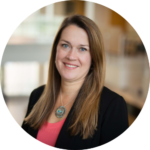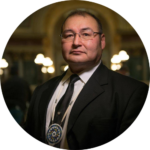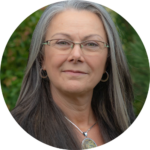Beloit College is located on the ancestral homeland of Indigenous peoples, and the Beloit College Mound Group remains a visual reminder of our settler colonialism. Since its founding in 1846, College-sponsored projects resulted in mound mapping and destruction by development and erosion, excavation and removal of ancestors and funerary belongings, and more recently, mound preservation, education, and reburial. This panel brings together the perspectives of a Tribal Historic Preservation Officer of the Ho-Chunk Nation of Wisconsin, whose ancestors called this landscape home, a Beloit College Professor of Anthropology and students whose work focuses on mound preservation and education, and the Director of the Logan Museum of Anthropology who has accelerated NAGPRA efforts at Beloit College. These contemporary perspectives offer examples of successes, shortfalls, and ongoing challenges in recognizing our responsibilities to stewarding our cultural landscape.
 NICOLETTE B. MEISTER
NICOLETTE B. MEISTER
Director and NAGPRA Coordinator
Nicolette B. Meister is Director of and NAGPRA Coordinator for the Logan Museum of Anthropology at Beloit College in Beloit, Wisconsin. She is Chair of the Museum Studies Program and annually teaches Collections Management and Care. In addition, she is Faculty Director of the Center for Collections Care, a hands-on summer program for museum, library, archive, and conservation professionals. Ms. Meister holds a B.A. in Anthropology from the University of Wisconsin, Milwaukee and a M.S. in Anthropology and Museum & Field Studies from the University of Colorado at Boulder.
 WILLIAM “NĄĄWĄCEKǦIZE” QUACKENBUSH
WILLIAM “NĄĄWĄCEKǦIZE” QUACKENBUSH
Tribal Historic Preservation Officer and Cultural Resources Division Manager
William “Nąąwącekǧize” Quackenbush, Ho-Chunk Deer Clan Member, is the Tribal Historic Preservation Officer and Cultural Resources Division Manager for the Ho-Chunk Nation of Wisconsin. In addition, Mr. Quakenbush serves as the NAGPRA designee alternative, ground penetrating radar operator, and Ho-Chunk National tribal historian and monitor. He is also President of the Wisconsin Intertribal Repatriations Committee.
 SHANNON M. FIE
SHANNON M. FIE
Co-Chair, Department of Anthropology, Beloit College
Shannon M. Fie is the Co-Chair of the Department of Anthropology at Beloit College, Beloit, Wisconsin where she teaches courses in anthropology, archaeology, and material culture studies. She also holds a research appointment in the Logan Museum of Anthropology and teaches in the Museum Studies Program. As an archaeologist trained in the study of ancient Native American sites, she assists the college in reporting disturbances and requesting and monitoring maintenance work within the Beloit College Mound Group. Dr. Fie earned her B.A. in Anthropology from Minnesota State University Moorhead and her M.A. and Ph.D. in Anthropology from the University at Buffalo-SUNY.
 ELAINA HEATON
ELAINA HEATON
Research Student
Elaina Heaton graduated from Beloit College (‘22) with B.A. in Anthropology and Environmental Studies. At Beloit, she was a founding member and later co-president of Campus Mounds Sustainability and Advocacy Initiative (CMSAI) which seeks to educate the college community about the Native American burial mounds on campus and Native culture and history. Currently, she is a research student with the Jordan-Israel Center for Communication, Environment, and Research at the Arava Institute in Israel where she is working to build a connection between the Southern Jordianan and Israeli communities through research, policy engagement, as well as environmental and sustainable development.
 JULIA HWANG
JULIA HWANG
Beloit College Graduate
Julia Hwang graduated from Beloit College (’22) with a B.A. in Anthropology and Museum Studies. Her interests lie in cultural anthropology, contemporary modern museum practices and collections, and Indigenous collaborations in museums. At Beloit, she researched and practiced these engagements as co-president of the Campus Mounds Sustainability and Advocacy Initiative and Museum Club, special project research, and work in the Logan Museum. Going forward, she plans to continue working to develop decolonizing practices in museums, institutions, and culture in our society by inviting BIPOC and LGBTQI+ voices.
